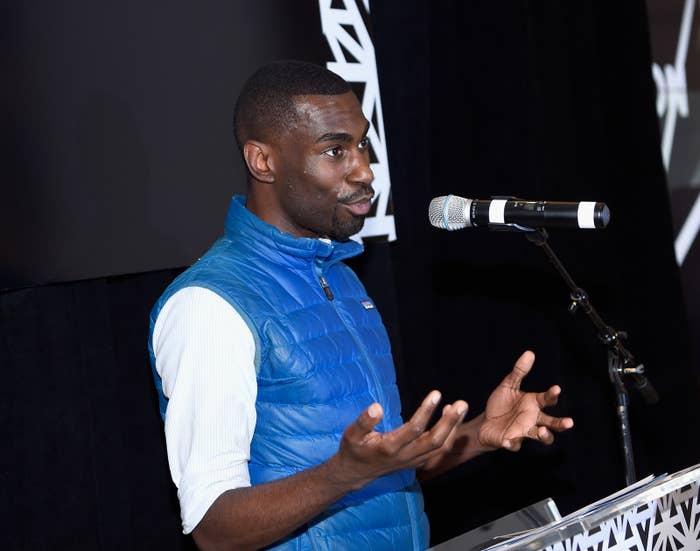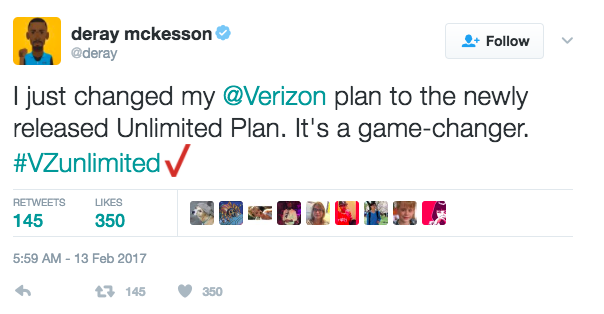Welcome to “Is This an Ad?,” a column in which we take a celebrity social media post about a brand or product and find out if they’re getting paid to post about it or what. Because even though the FTC recently came out with rules on this, it’s not always clear. Send a tip for ambiguous tweets or ‘grams to katie@buzzfeed.com.

THE CASE:
DeRay Mckesson, activist and organizer, tweeted about how happy he was with his new Verizon phone plan.

THE EVIDENCE:
There are three pieces of evidence here. Two indicate it’s an ad, and one suggests it isn’t.
1. No one in the history of forever has been excited about their cell phone plan, right? Everyone hates their phone company and their cable company; it’s not something that delights you like a candy bar or good quality black tights. It’s the lesser of several evils. So if you’re actually saying something nice about a phone company, you must be getting paid, right?
2. Notice the hashtag. It has the Verizon red checkmark logo in it — custom emoji for hashtags are one of Twitter’s advertising offerings. Using a branded hashtag is an incredibly high indicator for something being an ad, right?
3. Then we have the final piece of evidence, which should be weighed most heavily: the person who tweeted it. Mckesson is not the kind of person who does #sponsored tweets. His reputation is built on his integrity, and as a prominent activist, he occupies a space closer to something more like a politician — people who could not accept #sponsored tweets without serious professional repercussions — than, say, a Kardashian or even a Jonas brother.
THE VERDICT:
Shortly after the initial tweet, Mckesson tweeted that it was NOT an ad. He also confirmed to BuzzFeed News that it was not an ad, and he has never done any sort of sponsored tweets.
Even though it wasn’t an ad, quite a few of his followers thought it was, and tweeted back at him. Some even angrily chastised him for violating the FTC rules about disclosing when a social media post is an ad.
.@deray, it's ok not to do these tweets. https://t.co/5AejVGWtcs
@deray @verizon can you at least make a disclaimer that they did or didn't pay you bc we both know paid endorsements w/o one are illegal
@deray @verizon is there a corporation you won't bend over for dude? openly shilling is not a good look.
Deray is on CIA payroll with money laundered through Verizon and Spotify
This was clearly frustrating for Mckesson, who just wanted to earnestly share a good deal with people. “I had an incredibly expensive cell phone plan given how much I'm on my phone and the internet,” he told BuzzFeed News over text. “I'm legit excited about this new plan — it literally cut my phone bill in half.” What kind of cake-eating plutocrat wouldn’t be excited about saving money like that?
Apparently, this isn’t even the first time that Mckesson’s followers have accused him of doing deceptive sponsored tweets. “It happened when I tweeted about Dove Soap, Doritos, Spotify, and Patagonia, too,” he said. (He often wears a signature blue Patagonia vest.) “I'd just hoped that the immediate attacks on my integrity because of these types of tweets would have ended.”
The bad news is that celeb social media posts are so notoriously deceptive and done by flouting the rules that people are still confused. The FTC’s rules state that social media ads should be labeled clearly, or use a hashtag like #ad or #sponsored. But we’re so used to seeing people skip out on those clear labels that we’re ready to assume the worst.
The good news here is that people have gotten wiser and more skeptical about celebrities or people with large social media followings doing #ads. That’s a positive thing — the ability to identify ads masquerading as not-ads is an incredibly important tool to have, and it represents a new savviness on the part of consumers. Being able to tell when something on social media isn’t what it seems flexes the same muscle that identifying fake news does. For Mckesson’s followers — people interested in politics and hard news – being able to identify fake news (the real kind of fake news from bogus sites, not just “news I don’t like”) is critical. The fake-news-detector skill is so necessary that it’s now being taught to young people in high schools.
Whether or not an Instagram is sponsored or not might seem fairly silly. But in this light, the ability to tell when a Kardashian is being paid to promote a product is absolutely vital to the health of our democracy.
The moral here? Deceptive ads are eroding our country, and Verizon apparently has a great new deal on phone plans.

